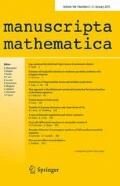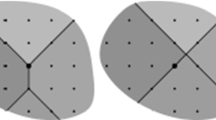Abstract
Let ρ:T→GL(V) be a finite dimensional rational representation of a torus over an algebraically closed fieldk. We give necessary and sufficient conditions on the arrangement of the weights ofV within the character lattice ofT for the ring of invariants,k[V]T, to have a homogeneous system of parameters consisting of monomials (Theorem 4.1). Using this we give two simple constructive criteria each of which gives necessary and sufficient conditions fork[V]T to be a polynomial ring (Theorem 5.8 and Theorem 5.10).
Similar content being viewed by others
References
O.M. Adamovich, E.O. Golovina: Simple Linear Lie Groups having a Free algebra of Invariants. Questions of Group Theory and Homological Algebra Vyp 2, Yaroslav. Gross. Unir. Yaroslavl' 3–41 (1980) English Translation in Sel. Math. Sov.3 183–220 (1983/84)
N. Bourbaki: Groupes et Algèbres de Lie Chapitres 4, 5 et 6. Hermann Paris 1968
C. Chevalley: Invariants of Finite Groups Generated by Reflections. Amer. Jour. Math. 778–782 (1955)
P. Gordan: Invariantentheorie. Chelsea Publishing Company New York 1987
V.G. Kac, V.L. Popov, E.B. Vinberg: Sur les groupes lineaires algebriques dont l'algebra des invariantes est libre. C.R. Acad. Sci. Paris Ser. I Math.283 865–878 (1976)
G. Kempf: Computing Invariants. S. S. Koh (Ed.) Invariant Theory (Lect. Notes Math.1278) 81–94 Springer-Verlag Berlin Heidelberg New York 1987
H. Kraft: Geometrische Methoden in der Invariantentheorie (Aspekte der Mathematik D1) Braunschweig-Wiesbaden: Vieweg Verlag 1984
H. Kraft: ℂ* on affine space. A. Connes, M. Duflo, A. Joseph, R. Rentschler (Eds.) Operator Algebras, Unitary Representations, Enveloping Algebras, and Invariant Theory (Progress in Mathematics92) 561–579 Basel Boston: Birkhäuser Verlag 1990
P. Littelmann: Koreguläre und äquidimensionale Darstellungen. J. Algebra123 No. 1 193–222 (1989)
T. Oda: Convex Bodies and Algebraic Geometry. An Introduction to the Theory of Toric Varieties. New York: Springer Verlag 1988
V.L. Popov: Modern Developments in Invariant Theory. Proc. Int. Cong. Math. 394–405 (1986)
G.W. Schwarz: Representations of Simple Lie Groups with Regular Rings on Invariants. Inv. Math.49 167–191 (1978)
G.C. Shephard, J.A. Todd: Finite Unitary Reflection Groups. Can. Jour. Math.6 274–304 (1979)
R. P. Stanley: Combinatorics and Commutative Algebra. (Progress in Mathematics; 41) Boston Basel Stuttgart: Birkhäuser 1983
D. Wehlau: A Proof of the Popov Conjecture for Tori. Proc. Amer. Math. Soc.114 839–845 (1992)
D. Wehlau: Constructive Invariant Theory for Tori. Annales De L'Institut Fourier43 (1993) (to appear)
Author information
Authors and Affiliations
Additional information
Research supported in part by NSERC Grant OGP 137522
Rights and permissions
About this article
Cite this article
Wehlau, D.L. When is a ring of torus invariants a polynomial ring?. Manuscripta Math 82, 161–170 (1994). https://doi.org/10.1007/BF02567695
Received:
Issue Date:
DOI: https://doi.org/10.1007/BF02567695




